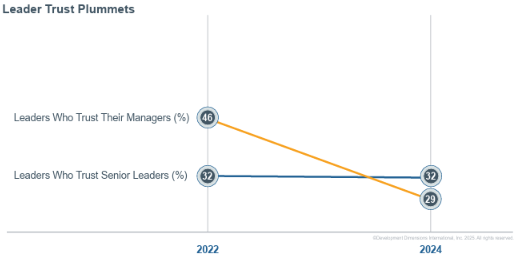
Stats show trust in managers fell from 46% to 29% in just two years

Trust in teams is a vital investment in success as rapidly changing workplace expectations create a challenge to managers credibility, according to a senior management researcher.
“It’s a key issue, which is why things like the Harvard Business Review has full editions on how to build trust,” Senior Lecturer in Management at the University of Sunshine Coast, Dr John Whiteoak, told HRD.
“Simply, trust boils down to making sure you act with integrity and clearly communicate with those you work with – something that’s more important than ever with a Gen Z workforce,” he said.
Stats from the 2025 Global Leadership Forecast shows leaders who trust their managers has fallen from almost half (46%) in 2022 to less than one in three (29%) in 2024.

““Global challenges, workplace polarization, and generational divides intensify the leadership trust crisis. Without strategic intervention, this erosion threatens retention, weakens leadership pipelines, and undermines organizational performance,” the report reads.
Dr Whiteoak said one of the challenges of building trust in leadership was an increasing cohort of younger workers.
Dr Whiteoak, who has more than 20 years’ experience working with organisations across different sectors, told HRD building trust isn’t easy – but it is simple.
“There’s a generational difference here – changing expectations in the workplace are naturally going to lead to a situation where people feel that there’s a disconnect between what is being said and what is being done. Managers need to be more empathetic, more supporting, and more authentic.”
Trust can also be “mismatched”, Whiteoak noted, between frontline workers and those in decision-making roles due to the difference in KPIs and achievements of each group.
“If you think you’re not being heard, or if you’re not being supported by those above you, you’re going to feel like you can’t put faith in them. But I must say it’s not just all on managers.”
The relationship between manager and employee is an important one – but trust must be earned, Dr Whiteoak emphasised, which can sometimes cause conflict.
“Managers can sometimes get pulled in two different directions. Looking at keeping people happy and making sure work gets done, which can cause a bit of friction. Trust isn’t always about niceness or about being liked – sometimes it comes down to being professionally sound.”
“If you can trust your manager and, ultimately, if they can trust you, you’re onto a winner. A manager may be harsher or less accommodating to one person compared to another, based solely on performance. Trust is a two-way street, and you need to trust those that are under you as much as they need to trust you.”
Whiteoak emphasised that trust can equal risk as you’re relying on someone else to perform – and if this professional relationship becomes too ‘risky’, trust can break down as a result.
So, how can trust be built in the workplace? Whilst hard to answer, it can be put down to streamlining processes.
“Don’t over-promise, don’t under-communicate and ensure you’re transparent with what’s going on – especially with younger workers, where that’s more important. There are 1000 books on what to and not to do, so I don’t have the exact answer,” Whiteoak said.
“But from my experience working with businesses and supporting high-performing teams, if you give trust in people and treat them with basic levels of respect and autonomy to do their job, you’ll come up trumps in the future. It’s an investment.”